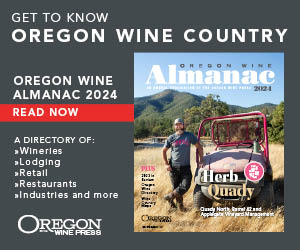Authentic Oregon
By Steve Baker
Over the years, the wines that captivate and inspire me have one thing in common: Regardless of origin, they are authentic. That is to say, they exhibit a lack of artifice, and a fidelity to tradition, culture and history. They are not created by a focus group, nor are they assigned artificial provenance or identities created by marketing departments and corporate beverage conglomerates.
These artisan wines stand out like beacons in the vast sea of mute, mass produced, soul-less wines that dominate the shelves of many wine shops and most supermarkets today.
It’s like the difference between a tomato from your backyard picked in summer and one flown in from Chile in the winter. There is no comparison—one actually tastes like it came from somewhere and the other hardly tastes of anything at all.
Although comparatively short on history, Oregon has already established a strong tradition as the home of authentic, small-production artisan wine, especially Pinot Noir. In fact, it can be argued that much of the mystique that fueled the success of Oregon wine in the early decades can be attributed to its identity as an artisanal product—scarce, handmade and unique. In other words: authentic.
But what defines authenticity? Is geography sufficient?
Perhaps to some it is. But I believe authenticity goes deeper than a merely a place.
Oregon’s Pinot pioneers came north 40 years ago to make the highest expression of North American Pinot Noir possible. They were inspired by Burgundy but sought something uniquely Oregon. In the early years, there was failure and frustration, sacrifice and success.
In time, something special took root. Many others would come behind them improving and expanding on the work of the Courys, Sommers, Letts, Ponzis, Eraths, Redfords, Sokol-Blossers and Adelsheims, (and others too numerous to mention here). Eventually Oregon Pinot Noir became synonymous with carefully made, small-production, artisan wine that speaks clearly of its origins—an identity that formed organically, incidentally.
Today, many seek to capitalize on the Oregon brand. Luxury spas and resorts have sprouted in the heart of Oregon wine country and mass produced Oregon Pinot Noir of average quality dominates distribution channels, diluting the brand and lowering the bar. (Anyone who takes a serious look at falling prices and lagging sales for Oregon Pinot Noir today can clearly see the deleterious effect of this low-end overexposure.)
Market correction or long-term trend, call it what you will, today’s rough patch is a reminder that authenticity can’t be created by a marketing department or a focus group, and clever packaging can’t make up for what’s not in the bottle.
The authenticity of Oregon wine can come only from the vineyard, where careful viticulture allows the soil to speak through the vine; and in the winery, where dedicated winemakers thoughtfully shepherd the resulting fruit through its journey into wine.
Only by keeping this in mind can the true character of Oregon wine be allowed to shine through and captivate and inspire new generations of curious wine drinkers who seek an authentic wine drinking experience—an authentically Oregon experience.
Steve Baker is the owner of Authentica Wines in Eugene.








